Up Close and Personal: Living With a Legend
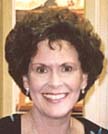 |
About the presenter: Devon Kundel writes: I was in the helping profession for 30 years. I received a degree in education and had a minor in psychology. I have had training also to work with people with dyslexia, ADHD, and Traumatic brain injury. I have taught in public schools, private schools, and at a university. . |
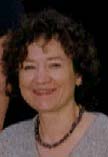 |
About the presenter: Marian Sheehan, PhD, CCC-SLP, is in private practice in Seattle, Washington specializing in pediatrics. She has presented numerous times at American Speech-Language-Hearing Association, state conventions and conferences. Her publications include articles in Journal of Speech and Hearing Disorders, Journal of Pediatrics, Archives of Physical Medicine and Rehabilitation, and Pediatrics. |
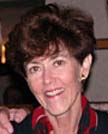 |
About the presenter: Jane Fraser graduated from Bryn Mawr College with a BA in Russian studies. Graduate work at Universite de Strasbourg, France, in Russian and Linguistics. Has been president of the Stuttering Foundation since 1981. Was a member of the NIDCD Advisory Council of the NIH, 1996-2000. From 1978-1980, worked as editor in cancer research, Institut Gustave Roussy, Villejuif, France. From 1975 to 1978 worked as interpreter and translator, Assemblee Nationale (Congress), Paris, France. She has been Trustee of Hamilton College, Co-chair, Parents Association, Pitzer College. Member of the Societe Francaise de Phoniatrie, and IALP. |
Up Close And Personal: Living With a Legend
Featuring reminsences from daughters of two of important leaders in the treatment of stuttering, Dean Williams and Joseph Sheehan and a few reminsences by Jane Fraser about Catherine Hull Van Riper, who was the wife of Charles Van Riper
- Thoughts on growing up with Dean Williams
- Sheehan Therapy as a Way of Life
- Catharine Jane Hull Van Riper
Thoughts on growing up with Dean Williams
by Devon Williams Kundel
from Missouri, USA
 I remember always being proud of Dad, Dean Williams, because he helped people. Maybe that's why I trained for a helping profession. After about 13 years of teaching and doing some tutoring on the side, I received training to work with people with dyslexia. Dad was concerned about the training, but when I told him it was the Orton-Gillingham method, he said, "Sam Orton?" When I acknowledged this, he said that he had worked with him some at the University of Iowa. Orton was a neurologist at the hospital. Jane Frasier sends me the Stuttering Foundation newsletter each time it is published. I am so interested to see the genetic research being done concerned stuttering. The studies I have seen have indicated a "family tree" incidence of both stuttering and dyslexia and some articulation problems. I am now retired on disability from post polio syndrome. My brothers are both involved in the medical field. Gordon is the vice president for finance of the Duke medical school and hospital. Koudy is a veterinarian and full professor at Wake Forest. He does heart research (primarily for female health) on monkeys at Bowman Gray.
I remember always being proud of Dad, Dean Williams, because he helped people. Maybe that's why I trained for a helping profession. After about 13 years of teaching and doing some tutoring on the side, I received training to work with people with dyslexia. Dad was concerned about the training, but when I told him it was the Orton-Gillingham method, he said, "Sam Orton?" When I acknowledged this, he said that he had worked with him some at the University of Iowa. Orton was a neurologist at the hospital. Jane Frasier sends me the Stuttering Foundation newsletter each time it is published. I am so interested to see the genetic research being done concerned stuttering. The studies I have seen have indicated a "family tree" incidence of both stuttering and dyslexia and some articulation problems. I am now retired on disability from post polio syndrome. My brothers are both involved in the medical field. Gordon is the vice president for finance of the Duke medical school and hospital. Koudy is a veterinarian and full professor at Wake Forest. He does heart research (primarily for female health) on monkeys at Bowman Gray.
I have one very early memory of my father. I had been paralyzed by the polio and had to learn to walk again. I have this picture of my dad at the far end of the room, encouraging me with his arms open to walk to him. That was the longest room in my life, but I'm sure it was just a few feet! He just kept smiling and saying that I could do it. I think that philosophy has carried me all my life. That is the one great gift from him that I have tried to pass along to my three sons. There was never a problem that couldn't be solved or faced. When I ever did some dumb stuff (and I did!), he would just sit down and say, "Well, I guess we better think about this and decide what to do." I was never afraid to go to him about anything. When he did "dumb stuff", I was also never afraid to go to him and tell him! He wasn't happy, but he listened.
There are some funny memories too. We used to love to go to a lake in Indiana for our vacation. We got to have soda (pop for us Midwesterners) every night after swimming as we played poker. Yes, my father taught me to play a pretty decent game of poker. I have passed on that skill to my granddaughters. (Much to their parents' dismay) My dad invented the "screaming sideslip" at the lake. We used to have contests diving off the dock. We would run down the dock to work up a head of steam and try to flip and then hit an inner tube in the water in the sitting position. One day Dad slipped, slid, and screamed as he went off the dock. He missed the inner tube, but got points for originality.
We used to love to go on the Stuttering Foundation of America trips with my folks. A group of my dad's colleagues would write pamphlets with advice for stutterers and parents of children who stuttered. We got to meet all of his cronies and had a ball. Wendell Johnson was willing to go exploring with us. When we found a neat cave we thought sure was a new discovery in Acapulco. Sue Ainsworth and I got into a bit of trouble canoeing out to a shrine in the ocean. We got out a bit far, but made it back to shore. We were proud even though our parents weren't! Then there was the time my mother and Katie Van Riper took a walk on Key Biscayne and tried to see some pretty flowers over a wall. The problem was, it was then President Nixon's Key Biscayne compound. The Secret Service met them at the top of the wall. Dad and Van had to go get them at the police station! I think Dad thought it was funny, but shy Van scolded "K-K-K- Katie!"
By the way, did you know the song, "K-K-K- Katie" was always sung at their get-togethers?
Thank you for letting me share.
Sheehan Therapy as a Way of Life
by Marian Sheehan
from Washington, USA
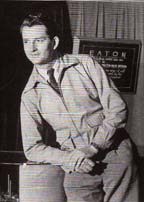 My parents, Joseph and Vivian Sheehan, both grew up in Michigan and met during World War II at Percy Jones Army Hospital in Battle Creek. My mother, a speech-language pathologist in her own right, was setting up the first brain injury rehabilitation program and my father became one of her employees. My mother once quipped in an interview "I hired Joseph Sheehan on the spot because he was a good speech pathologist. Then I married him to keep him on the job." Of course, my father wasn't a legend then nor I am certain when he became one.
My parents, Joseph and Vivian Sheehan, both grew up in Michigan and met during World War II at Percy Jones Army Hospital in Battle Creek. My mother, a speech-language pathologist in her own right, was setting up the first brain injury rehabilitation program and my father became one of her employees. My mother once quipped in an interview "I hired Joseph Sheehan on the spot because he was a good speech pathologist. Then I married him to keep him on the job." Of course, my father wasn't a legend then nor I am certain when he became one.
In 1949 UCLA offered my father a teaching job in the Dept of Psychology, so my parents moved from the Midwest to Southern California. My father founded the Stuttering Clinic at UCLA shortly after arriving. I was born in 1950, my sister Kathleen in 1952 and my brother Joe in 1954. Although my mother still lives in the house they bought in Santa Monica in 1954, we traveled a great deal. Summers and sabbaticals my father would teach as a visiting professor so for brief stints we lived in Boston, Boulder, Vermont, Syracuse, Portland, Berkeley, Michigan and Indiana. My parents always attended the ASHA conventions, state conventions and various conferences often with all three children in tow. By the time I was 15 years old, I had crossed the Rockies thirty times and had been in 49 of the 50 states.
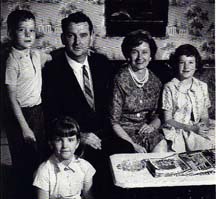 At home, my dad, a.k.a. "Big Joe", was the proverbial absent-minded professor and often described himself as such. My mother kept him organized and on-task as best she could. That had to have been a major challenge. Whenever my brother or sister or I asked him, he was willing to drop what he was doing to take a bike ride, hit a few tennis balls, help with homework or play a game. It was fun to be with him. He had a large repertoire of jokes but was witty as well. He never missed the opportunity to make a pun or to spot the irony in a situation. He readily laughed at himself. Big Joe was the pushover parent who rarely said no, always had a few dollars to slip you and never told you to make your bed or clean your room.
At home, my dad, a.k.a. "Big Joe", was the proverbial absent-minded professor and often described himself as such. My mother kept him organized and on-task as best she could. That had to have been a major challenge. Whenever my brother or sister or I asked him, he was willing to drop what he was doing to take a bike ride, hit a few tennis balls, help with homework or play a game. It was fun to be with him. He had a large repertoire of jokes but was witty as well. He never missed the opportunity to make a pun or to spot the irony in a situation. He readily laughed at himself. Big Joe was the pushover parent who rarely said no, always had a few dollars to slip you and never told you to make your bed or clean your room.
As a child, I was aware of what my parents did for a living. They lived and breathed it. At family dinners the topic of conversation was often stuttering and/or psychology. There were frequently groups of stutterers and/or UCLA graduate students at our home for meetings or parties or joining us for a backyard barbecue. We three kids were available for stutterers to introduce themselves to while practicing "sliding" on their names. We knew to maintain eye contact and not to supply words, though I have no memory of direct coaching on these points. I do remember being instructed that when we answered the phone and no one said anything, it was very important not to hang up. The caller might be someone working on his/her speech and we needed to give that person time. Consequently, we listened to the occasional heavy breathing, prank caller far longer than deserved. In fact, it became known among my high school friends that the Sheehan household was a good bet for prank calls because Sheehans did not hang up on you.
It has only been in retrospect that I realize I grew up in a 'therapeutic' environment. From my vantage point as SLP, I now see how the Sheehan therapy concepts permeated my dad's parenting style as well as the way he lived his life and dealt with people. My dad practiced what he preached or perhaps he preached what he practiced. It is impossible (at least for me) to separate my dad's approach to life from his approach to helping those who stutter. He was always liberal and tolerant of people and their individual differences except when he perceived a viewpoint as an injustice or detrimental to others. Then he was not at all shy about public confrontation. He challenged those ranging from the pro-punishment behaviorists of the 1960's to those including my more rigid, authoritarian high school teachers whom my dad believed had the wrong demand-support ratio and told them so, that is, making too many demands, not providing enough support.
My dad's parenting advice on problems always incorporated action-oriented solutions. He would counsel that we must "do something to feel better about the situation" and then he help us come up an appropriate action to take. When one of us kids was nervous about an oral report or a performance, he would reassure us that "it doesn't need to be perfect, just make eye contact, resist time pressure and you will be fine." And I must have heard "just be yourself" a million times. Big Joe generally felt that pressure of any sort, but especially time pressure, was a negative and to be resisted and not just when speaking. As I was learning to drive, he repeatedly cautioned me to resist time pressure from other drivers. I have recently found myself using those same words with my 16 year old daughter.
My parents always seemed little different from most other parents. They remained Midwesterners living in Southern California, never going to the beach to sunbathe nor understanding why people would. It was shocking to some neighbors that my mother actually worked and my family did not attend church regularly. My parents were bookish, intellectual liberals--characteristics which raised suspicions during the McCarthy Era and that lingered well beyond. My liberal father insisted our family boycott products manufactured by companies who contributed to causes he protested. No Welch's candies for us, because the owner of Welch Candy Company was also the founder of the John Birch Society. Consequently, consumption of Sugar Babies and Junior Mints became part of my adolescent rebellion.
My best friend and next door neighbor had a strict, traditional 1950s mother who routinely criticized my father for being a "permissive" parent. My friend's mother was convinced that my siblings and I would grow up to be ne'er-do-wells because my father "didn't believe in punishment." My dad would calmly respond "Life is punishing enough without inflicting punishments of our own."
Big Joe was always loving, accepting and supportive. Whereas my friends' parents would express disappointment or ground their child for a mediocre report card, my dad put no such demands on performance. We knew he expected us to do well and to try our best, but however it turned out was okay. There were times he was clearly worried about us, but we never felt he was disappointed in us. My dad could always find some element of success and comment on it. At sixteen I was chagrined to barely pass my driving test by a mere 2 points. I remember my dad's comment was that I had scored 2 points more than I needed. That comment was typical of my father's attitude.
Unlike any other parent I knew, Big Joe loved to watch Saturday morning cartoons and slapstick comedies with us kids, and sometimes without us. Laurel and Hardy were his all-time favorites, but he was also an avid fan of Dudley Doo-right, Charley Brown, George of the Jungle, and The Three Stooges among others. This behavior is likely what led another relative to tell me that my father was "just a big kid at heart." But looking back, I think it was more than that. I think my father really admired and related to such bumbling doofus characters. They represent the antithesis of my father's "Giant in Chains" concept--the stutterer who feels held back from greatness only because of his stuttering. These characters moved forward through life with good humor and high expectations for success, undeterred and unembarrassed by their inevitable, predictable, frequent stumbles and foibles.
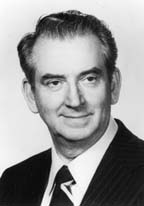 My view of my father shifted completely when I was an 18-year-old undergraduate at UCLA. After months of my dad suggesting that I take his class, I unofficially, anonymously, silently sat in the back corner of an upper division psychology class he was teaching. I had always known he was an absent-minded professor, but it was only the absent-minded side of the equation with which I was familiar. As a typical teenager I had cast my father in my mind as a Dagwood Bumstead-type character who knew little and was an utter embarrassment. Observing his professorial side in that classroom was a stunning revelation for me. I had had no idea my father was a dynamic public speaker who commanded the respect and rapt attention of his students. It was amazing to see all these bright college students hanging on my dad's every word, seeking his opinions on a variety of topics and enjoying his good humor and perspective. I remember feeling genuinely proud of my dad and realizing that maybe he knew a thing or two after all.
My view of my father shifted completely when I was an 18-year-old undergraduate at UCLA. After months of my dad suggesting that I take his class, I unofficially, anonymously, silently sat in the back corner of an upper division psychology class he was teaching. I had always known he was an absent-minded professor, but it was only the absent-minded side of the equation with which I was familiar. As a typical teenager I had cast my father in my mind as a Dagwood Bumstead-type character who knew little and was an utter embarrassment. Observing his professorial side in that classroom was a stunning revelation for me. I had had no idea my father was a dynamic public speaker who commanded the respect and rapt attention of his students. It was amazing to see all these bright college students hanging on my dad's every word, seeking his opinions on a variety of topics and enjoying his good humor and perspective. I remember feeling genuinely proud of my dad and realizing that maybe he knew a thing or two after all.
Growing up with my father and then becoming an SLP has given me the opportunity to appreciate both the professional and personal aspects of Joseph Sheehan and to realize how integrated the professional and personal were. I hadn't an inkling how well-respected and well-known he was in our field until I was in graduate school. Sometimes I am still surprised by the extent of his name recognition and by his reputation. To me, he will always be my dad first, and a legend second.
Catharine Jane Hull Van Riper
by Jane Fraser
from Tennessee, USA
Although Katy Van Riper lived with a "legend," - her husband, Charles Van Riper - she could be considered a "legend" in her own right. I knew Katy, not as a family member, but as a close friend for over 30 years. We corresponded frequently. The following powerpoint about Katy Van Riper was adapted from a presentation, Duchan, J; Fraser, J, Kuster, J; Ratner, N; and Sheehan, M, Our Foremothers & Their Contributions to the Profession, ASHA, San Diego, CA, November. A few photos were added as well as information about Katy as a speech therapist from one of her former clients.
View the PowerPoint on Catharine Van Riper
September 1, 2006

